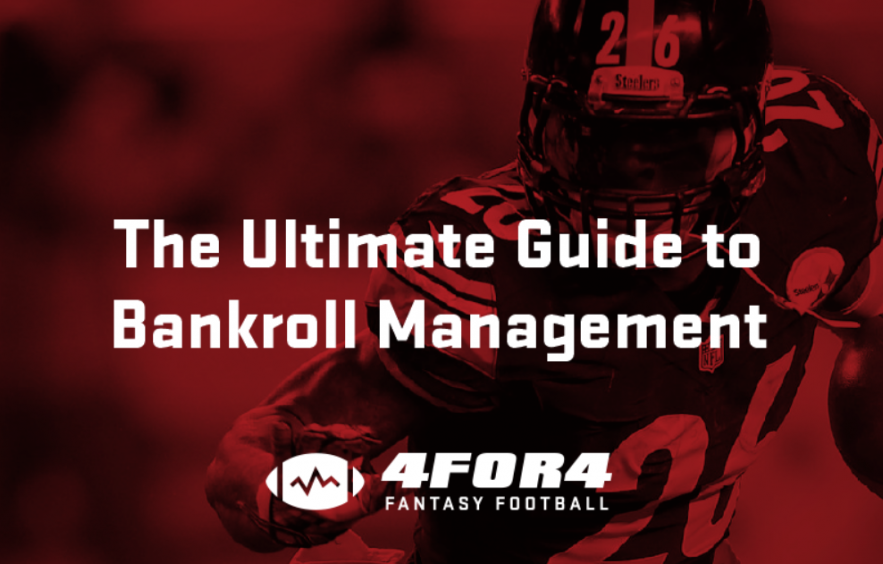Guide to DFS Bankroll Management: Setting Goals

Bankroll management is one of, if not the, most important aspects to being a profitable DFS player, but few players truly understand bankroll management or have the discipline to stick to a plan. One reason is that there is no one-size-fits-all strategy for managing your money. Rather than looking at exactly how much money DFS players should put into play—which we’ve done before at 4for4—this series is designed to go beyond the cookie-cutter rules that so many DFS players abide by and help formulate a goal-oriented process for every type of player.
More in the DFS Bankroll Management series: Game Selection | Risk Management
Just Set Goals
Before making your first deposit on a DFS site, the single most important thing you can do for your daily fantasy livelihood is to make a list of goals. If you already play DFS and haven’t set concrete goals for yourself, make that your primary focus before building another lineup.
Setting goals and deciding exactly what you want out of this game will help you build the foundation for every aspect of your game, including bankroll management, game selection and how you prepare each week—all topics that will be reviewed in this series.
Because every daily fantasy player is starting on their own accord, with a unique situation, everyone’s goals will be—and should be—different. Whether you are embarking on a journey to take down a live final, or just want some extra spending money come Christmas time, a solid list of goals is essential in reaching your destination.
Who Are You?
When it comes to games of incomplete information, such as DFS, people generally fall into two categories: Those who are risk-takers and those who are risk-averse. Like many elements of gaming, there is usually some gray area when measuring a player’s risk aversion, but you have to be honest with yourself on what side of the spectrum you fall on.
The level of risk you are willing to take on is going to have a major influence on the goals you set for yourself. Someone who is very conservative with their money is going to have a difficult time if their main focus is qualifying for a live final. On the flip side, a daily fantasy footballer with an abundance of expendable income might find grinding 50/50s and head-to-head games very boring and tedious. There is no right or wrong player to be when it comes to risk tolerance, but like with many aspects of daily fantasy football, you must be able to give an accurate self-evaluation of yourself in order to set realistic goals.
Monetary Goals
In daily fantasy, there are monetary goals and process-oriented goals. One of the greatest downfalls for any player is often a lack of monetary goals. Starting with a $100 deposit and telling yourself that you want to win $1 million is obviously a pipe dream. Having realistic monetary expectations with a deliberate plan of action, though, can serve as a daily motivator to be diligent in your daily preparation for DFS.
Games that combine skill with luck will always have mixed results due to variance—some variance good and some bad. This inherent variance is what might dissuade even very experienced players from setting hard monetary goals. The ultimate assailant of variance is volume; the more you play a game, the greater accuracy you will have in assessing your true edge (or lack thereof). Volume is why DFS players can and should set monetary goals, at least for the long term.
Of course, in the NFL there are only 17 weeks of football. No matter how much money you have or how many games you post in a lobby, it’s virtually impossible to know your true edge in one NFL season. Because real football players are so dependant on the performance of their teammates and the season is so short, NFL may have the highest variance of any DFS sport over an entire season. It’s entirely possible for a winning NFL DFS player to lose money over an entire NFL season, and vice versa.
Does this mean you shouldn’t set monetary goals for daily fantasy football? In short, no. It does mean that we should put considerably more emphasis on our process-oriented goals, which will, in turn, help build practical monetary goals.
Process-Oriented Goals
The beauty of daily fantasy football is that virtually the whole game is preparation. The physical act of setting a lineup and entering games takes virtually no time compared to the week of research leading up to kickoff. With so much free time compared to other daily fantasy games, the goal of the NFL DFS process should be to fill your week with the most effective and efficient resources possible.
Here are some of the processes I reflect on most when critically analyzing my preseason and mid-week preparations:
- Have I set and stayed within my bankroll limits? Knowing how much money you plan on investing in daily fantasy football is the framework for how many games you play each week and how you will allocate funds across various game types.
- Am I using the most effective methodology to build my lineups? 4for4 offers a plethora of groundbreaking work on player types and statistics that have the strongest correlations with DFS success. Many of the statistics and research topics found in the DFS Strategy Hub can immediately help improve your bottom line and are the backbone for my weekly process.
- Am I seeking outside opinions? We all have our favorite writers and websites. While I will only suggest tools and authors that I truly believe in and use in my personal research, it’s important to seek an outside voice. As daily fantasy football players, we must ensure we avoid confirmation bias. In other words, don’t just pursue information that backs up your beliefs. Use conflicting outlooks as an opportunity to grow and maybe work an angle you might not have recognized otherwise.
- Am I an effective self-evaluator? Every serious daily fantasy football player should have at least one friend they continuously talk the game with. Forcing yourself to articulate and justify every single lineup decision to another educated mind is one of the quickest ways to develop your own DFS mind. If you are absolutely new to the community, at the very least take notes as if you were talking to another person. Don’t just think through it. Write out your process, leave it alone and come back later to see if you still agree with yourself.
- What am I taking for granted? As I mentioned earlier, there are many topics that will be covered in later lessons that will tie back to your goals. Every aspect of your game should be scrutinized to make you a better daily fantasy footballer. Make sure the site(s) you play on is right for you. Seek out bonuses and free advice. Pay attention to how much rake you are paying. No matter how seemingly mundane, every factor of your game contributes to your overall success as a daily gamer.
Linking Together Monetary and Process-Oriented Goals
When setting goals, especially as a new DFS player, it might be best to work backward. Decide what you want out of this game and then begin to build a roadmap to get there. While optimism is encouraged in the goal-setting process, it’s important that our goals factor in the speedbumps that might come along the way. Resources found in the DFS Strategy Hub discuss realistic win probabilities and the inevitable bankroll swings. Use these tools to decide if you are setting sensible goals for yourself. Here’s an example of turning a vague goal into a reasonable goal with an actionable plan:
- Vague Goal: “I want to win $5,000 playing daily fantasy football in 2018.”
- Realistic Goal: “Given a $5,000 starting bankroll and the expected winning percentage of each game type, I’d like to double my bankroll in 2018. I will never play more than 10 percent of my total bankroll in a given week, and of that 10 percent, 85 percent of my money will go towards head-to-head games and 50/50s. Before the season starts, I will read at least one book on DFS strategy and one book on gaming psychology, while also joining a DFS discussion forum and at least one DFS advice website. Once I have decided which DFS sites I will play on and which research tools I will use each week, I will spend one hour per week reviewing how effectively I used those resources and one hour discussing past and future lineup decisions with another DFS player. In order to ensure maximum growth, I will not withdraw any funds from my DFS accounts until after Week 17.”
You can get as specific as you want with each step of your process. No matter your final goal as a daily fantasy football player, have an actionable plan that you can be held accountable for and stick to it.
In the coming lessons, I will expand on the topics that are touched on here, which will aid in the goal-setting process.






















